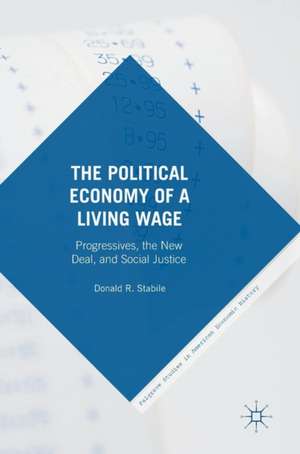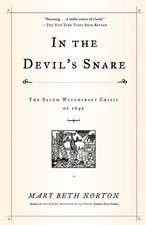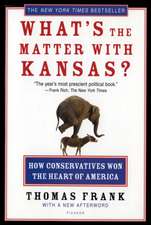The Political Economy of a Living Wage: Progressives, the New Deal, and Social Justice: Palgrave Studies in American Economic History
Autor Donald Stabileen Limba Engleză Hardback – 5 sep 2016
| Toate formatele și edițiile | Preț | Express |
|---|---|---|
| Paperback (1) | 772.85 lei 6-8 săpt. | |
| Springer International Publishing – 14 iun 2018 | 772.85 lei 6-8 săpt. | |
| Hardback (1) | 637.30 lei 6-8 săpt. | |
| Springer International Publishing – 5 sep 2016 | 637.30 lei 6-8 săpt. |
Preț: 637.30 lei
Preț vechi: 716.07 lei
-11% Nou
Puncte Express: 956
Preț estimativ în valută:
121.95€ • 130.40$ • 101.68£
121.95€ • 130.40$ • 101.68£
Carte tipărită la comandă
Livrare economică 17 aprilie-01 mai
Preluare comenzi: 021 569.72.76
Specificații
ISBN-13: 9783319324722
ISBN-10: 3319324721
Pagini: 392
Ilustrații: X, 292 p.
Dimensiuni: 148 x 210 x 21 mm
Greutate: 0.49 kg
Ediția:1st ed. 2016
Editura: Springer International Publishing
Colecția Palgrave Macmillan
Seria Palgrave Studies in American Economic History
Locul publicării:Cham, Switzerland
ISBN-10: 3319324721
Pagini: 392
Ilustrații: X, 292 p.
Dimensiuni: 148 x 210 x 21 mm
Greutate: 0.49 kg
Ediția:1st ed. 2016
Editura: Springer International Publishing
Colecția Palgrave Macmillan
Seria Palgrave Studies in American Economic History
Locul publicării:Cham, Switzerland
Cuprins
1 Introduction: The Economics of a Living Wage.- 2 The Living Wage from World War I through the Great Depression.- 3 Planning a Living Wage: The NIRA.- 4 A Useful and Remunerative Job: The National Labor Relations Act.- 5 Social Security: Protection from Old Age and Unemployment.- 6 The Right to Earn Enough: The Fair Labor Standards Act.- 7 Collective Bargaining, Social Insurance and the Minimum Wage: A Program for a Living Wage.
Notă biografică
Donald R. Stabile is Professor at St. Mary’s College of Maryland, USA, where he has taught economics for over 35 years. He is the author or co-author of eleven previous books, including The Living Wage (2009), and scholarly articles on the history of political economy.
Textul de pe ultima copertă
This book tells the story behind President Franklin D. Roosevelt’s use of the phrase "living wage" in a variety of speeches, letters, and statements, and examines the degree to which programs of the New Deal reflected the ideas of a living wage movement that existed in the US for almost three decades before Roosevelt was elected president. Far from being a side issue, the previously unexplored living wage debate sheds light on the New Deal philosophy of social justice by identifying the value judgments behind its policies. Moving chronologically through history, this book's highlights include the revelation of a living wage agenda under the War Industry Board (WIB)'s National War Labor Board (NWLB) during World War I, the unearthing of long-forgotten literature from the 1920s and 30s that formed the foundation of Roosevelt's statements on a living wage, and the examination of contemporary studies that used a simple living wage formula combining collective bargaining, social insurance,and minimum wage as a standard for social justice used to measure the impact of New Deal polices.
Caracteristici
Reveals archival evidence of early living wage agendas Explores the social justice foundations of the New Deal Traces the idea of a living wage back to the Progressive era


















